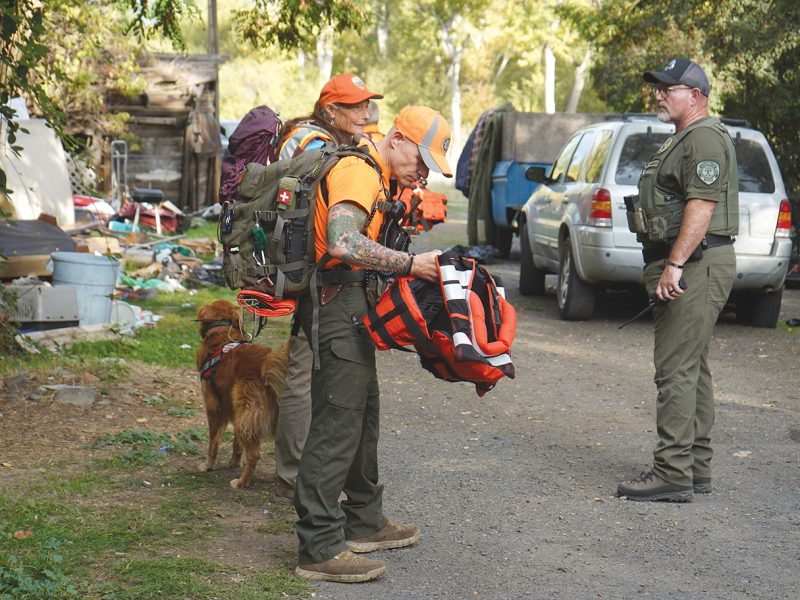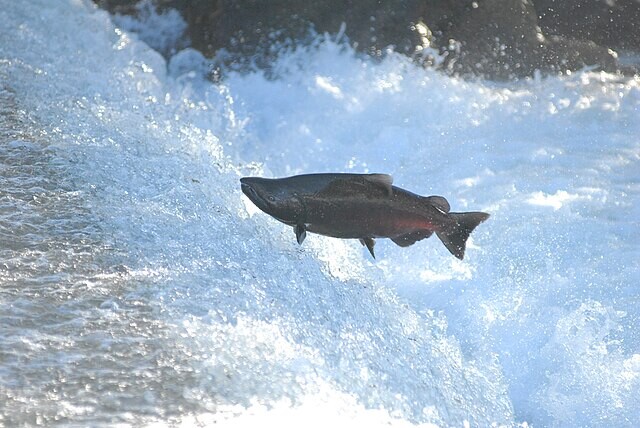Walla Walla Chief Sampson disagrees with the decision
By the CUJ
MISSION – The tribe’s commitment toward protecting the Columbia River’s fish populations involved extending an agreement with regional tribes and government agencies.
The Board of Trustees signed a two-year extension to the Columbia Basin Fish Accord Oct. 19, directing staff to work with four organizations to develop tools to be used to inform them on hydro-system and fishery issues and decisions.
“While we’ve seen progress in tributary fish habitat conditions and lamprey returns, it’s clear we need to do more,” BOT chairwoman Kat Brigham said in an Oct. 23 press release. “Salmon fishing opportunities for our tribal members haven’t been consistent enough and we need more fish.”
Don Sampson, a hereditary chief of the Walla Walla tribe who attended an October General Session via Zoom, is pessimistic about the fish accord’s benefits to fish populations.
“What I demonstrated to the Board is that we’ve seen the data the tribal fisheries program produced,” he said. “We’ve only had 111 salmon harvested in 20 years. That’s an average of five salmon per year for 3,000 members, every year. There’s no way that that (Accord) represents what our tribal leaders, our chiefs negotiated when we protected our salmon fishery in our Treaty of 1855.”
Though salmon numbers may be down, Pacific lamprey fishing became a possibility for the first time in 75 years during the early years of the accord, according to the release.
By signing the extension, CTUIR staff will work with Columbia River Inter-Tribal Fish Commission (CRITFC), the CTUIR Fish and Wildlife Commission, the Cultural Resources Committee, and the Tribal Water Commission on four projects, according to the resolution.
The Federal Columbia River Power System (FCRPS) treaty rights impact report and an FCRPS tribal social and cultural impacts report from the tribal perspective.
A marine policy that can be used to foster and leverage collaborative relationships on the West Coast.
A regional energy plan to provide solutions that include Snake River Dam breaching and/or alterations coinciding with the development of other energy and transportation sources.
Staff endeavor to link ongoing processes in the Columbia River Basin to this work wherever appropriate.
“We will be coordinating through our internal CTUIR Columbia River Accord group and CRITFC to leverage relationships and resources in the region to develop these other tools to complement our tributary restoration, production, harvest and ultimately our River Vision efforts,” BOT Vice-Chair Jeremy Wolf said in the release.
The Tribe signed the Accord in 2008, which included participation from Bonneville Power Administration, U.S. Army Corps of Engineers, the Bureau of Reclamation, the Yakama Nation, the Confederated Tribes of the Warm Springs Reservation, and the Columbia River Inter-Tribal Fish Commission.
“The Fish Accord strengthened the tribal voice in the management of the Columbia River, and created a new relationship with three federal agencies,” the resolution states. “The Fish Accord more than doubled the capacity to implement the Confederated Tribes’ fish project designed to increase the number of salmon, steelhead, lamprey, sturgeon, and mussels available to tribal fisheries, and provided 10 years of funding certainty and stability for tribal fisheries programs, enhancing these important expressions of tribal sovereignty.”
Brigham noted that reaffirming the accord “keeps in place the funding we expected since 2018, and gives us time to develop additional tools to address salmon recovery. We need an energy policy that can help change hydro operations to speed salmon recovery and a marine policy to help us advocate for our fish and their ocean habitat.”
Sampson, a fish biologist who has served as BOT Chair and CTUIR executive director, said the Endangered Species Act, the Clean Water Act, the National Environment Policy Act (NEPA), and the Northwest Power Act are four reasons the tribe cannot sue over the loss of the salmon.
Because of “all four of those,” he said, “we are restricted from filing suit. If the federal government isn’t doing enough, we can’t sue them over it. That’s the problem with it. Even though it’s a two-year accord, I’ve pressed the Board to try to be aggressive and move forward with one thing that will work and has proven elsewhere to work: removing the four Snake River dams. Those are the biggest killers of salmon.”
The agreement signed in 2018 originally was through 2022, until President Trump issued an Executive Order that accelerated the timeline for completion of the NEPA compliance documents to September 2020, according to the Resolution.



